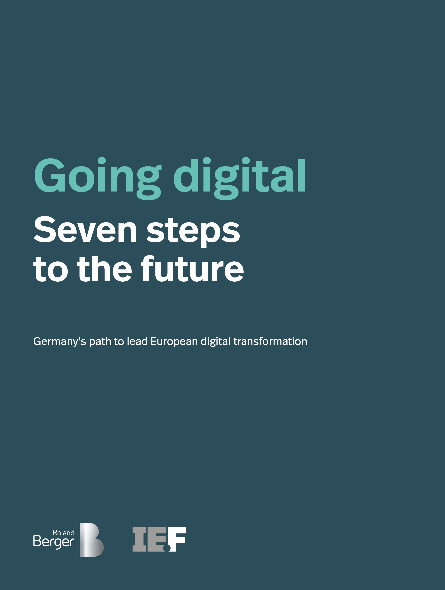Going digital: Seven steps to the future
![{[downloads[language].preview]}](https://www.rolandberger.com/publications/publication_image/roland_berger_ief_deutschland_digital_e_20160428_1_download_preview.png)
This study identifies seven key steps for Germany can take to expedite its digital development.


No one needs to say that the internet has fundamentally changed the world we live in—this is now a given. Digitization, however, has become far more than the fourth Industrial Revolution with which the concept of Industry 4.0 equates it. Social, economic, and political changes that transcend every physical and conceptual barrier have ushered in World 4.0, and in World 4.0 there is something that no one can take for granted: the right to remain competitive. If Germany and the European Union want to compete in the economy of the future, they have to take an active role in writing the rules it will be played by. And, they need to do it now.
That is why we commissioned this study in collaboration with the Internet Economy Foundation (IE.F), an organization and pioneering voice defining the interests of the German and European internet economy in a global context. The result of our extensive research is a series of recommendations in seven key areas that can boost Europe’s position in the digital economy and help ensure long-term competiveness with the US and other leading nations. Germany and Europe need to catch up, and the stakes were never higher: the European manufacturing industry alone could add 1.25 trillion euros to its gross value worth by 2025, or suffer the loss of 605 million euros if it fails to implement the needed digital transformation.

In this exclusive publication, we take an in-depth look at each of these seven key areas for improvement: finance, infrastructure, competition, data protection, governance, digital literacy, and business culture. A central finding of the study is that young German businesses will need growth capital of approximately 50 billion Euros in the next five years to take advantage of digitization opportunities for Germany. This is far from all, however. From recommendations on strengthening network capabilities and coverage to challenging monopolies, protecting EU citizen data, and teaching digital literacy as an educational cornerstone, this study seeks to rally Germany and Europe around a new entrepreneurial spirit with the momentum to achieve real, ongoing success.

![{[downloads[language].preview]}](https://www.rolandberger.com/publications/publication_image/roland_berger_ief_deutschland_digital_e_20160428_1_download_preview.png)
This study identifies seven key steps for Germany can take to expedite its digital development.